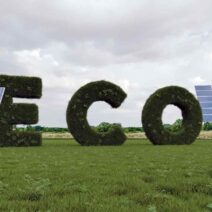As the planet perpetually rotates in its intricate dance around the sun, an insidious force is reshaping the very fabric of our environment: climate change. This multifaceted phenomenon transcends regional boundaries and demographic lines, profoundly influencing ecosystems, economies, and everyday lives across the globe. The ramifications are staggering, yet often overlooked, as the urgency of the situation mandates a shift not merely in perspective but in action.
At the crux of this existential challenge lies the concept of greenhouse gases—specifically carbon dioxide, methane, and nitrous oxide. These substances, which have increased dramatically since the Industrial Revolution, act as a heat blanket around the earth. As they accumulate, they exacerbate the natural greenhouse effect, leading to an overall increase in global temperatures. This seemingly benign rise in temperature belies its far-reaching consequences, as altered weather patterns disrupt agricultural cycles, threaten biodiversity, and intensify natural disasters.
Consider the implications of altered precipitation patterns. Regions once abundant in agricultural yield are now beset with drought, while others experience relentless flooding. This dual crisis of too much and too little water complicates food security, particularly in nations where agriculture constitutes a lion’s share of economic activity. Climate data indicates that these disruptions could lead to a staggering increase in food prices, forcing impoverished communities deeper into despair. Yet, this challenge compels us to reevaluate our relationship with food production, urging innovation in sustainable farming practices that could restore balance.
In tandem with altered precipitation patterns, the melting of polar ice caps epitomizes the urgency of climate action. Glaciers, once steadfast sentinels of time, are receding at an alarming rate. Sea levels are rising, threatening coastal cities and fragile ecosystems alike. The specter of displacement looms large, with millions potentially fleeing their homes due to encroaching waters. This situation necessitates proactive planning, emphasizing resilient infrastructure and adaptive strategies that harmonize human habitation with the evolving climate landscape.
Moreover, the impact of climate change is not confined to the natural world; it permeates the social fabric as well. Underlying social inequities threaten to exacerbate the already precarious situation. Vulnerable populations, often the least responsible for emissions, bear the brunt of climate disruptions. Women, children, and displaced communities find themselves disproportionately affected, yet their voices frequently go unheard in decision-making processes. There lies an opportunity to amplify these perspectives, ensuring that climate justice is at the forefront of global discourse.
Beyond the immediate humanitarian implications lurks the specter of economic upheaval. The global economy, intricately woven and interconnected, faces multifarious threats from climate change. Industries reliant on natural resources—fishing, forestry, and agriculture—are not merely adapting; they are being irrevocably altered. A changing climate compels businesses to rethink traditional practices, driving innovation toward sustainability. Renewable energy sources—solar, wind, and geothermal—emerge not as ancillary options but as imperatives for a resilient future.
In this crucible of change, the young generation stands at a unique crossroads. Empowered by technology and armed with an indomitable spirit, these activists are demanding accountability from governments and corporations. Social media has become a formidable tool, galvanizing collective action around the globe. Movements advocating for systemic change, such as Fridays for Future and Extinction Rebellion, exemplify the zeal of youth in confronting climate inaction. Their fervor serves as a clarion call to all generations, resonating with the realization that the future of the planet is intertwined with our ability to act decisively today.
The dialogue surrounding climate change is perpetually evolving, yet it often reveals an incomplete understanding of the intricacies involved. The intersection of climate science with socio-ecological systems emphasizes the importance of interdisciplinary approaches. Collaborative efforts among scientists, economists, and policymakers engender comprehensive solutions, as isolated strategies yield inadequate results. By fostering dialogue that transcends disciplinary boundaries, we can cultivate innovative practices adept at navigating the complexities of climate change.
Compounding the crisis is the phenomenon of climate-induced migration, a reality that merits significant attention. The movement of people in response to environmental changes poses not merely logistical challenges but ethical considerations as well. As climate refugees seek sanctuary from the ravages of their homelands, nations must confront questions surrounding borders, citizenship, and human rights. Approaching this matter requires a concerted effort to craft humane policies that acknowledge the intricacies of displacement, while facilitating resources for adaptation and reintegration.
Despite the bleak outlook, a sense of hope permeates the discourse surrounding climate change. Individuals and communities are not passive recipients of change; they are active stewards of their environments. Grassroots initiatives are proliferating, demonstrating local solutions to global challenges. Community gardens, conservation efforts, and renewable energy cooperatives embody the resilience of people coming together to foster sustainable practices. These initiatives not only mitigate climate impacts but also reinforce the intricate relationship between humans and the natural world, reminding us that stewardship transcends ownership.
The narrative of climate change is one of interconnectedness—both with the planet and among people. It urges a reimagining of our priorities, calling for a comprehensive, equitable approach to navigate the complexities of an ever-changing world. Only through cooperation, innovation, and an unwavering commitment to justice for all life can we forge a sustainable future in which humanity thrives in concert with the earth’s rhythms. This journey, fraught with challenges, also offers unprecedented opportunities for growth, reminding us that the ripples of today shape the tides of tomorrow.


